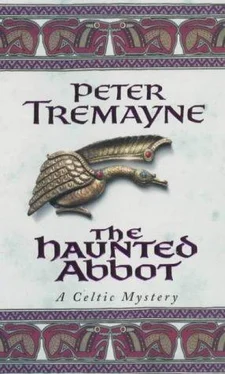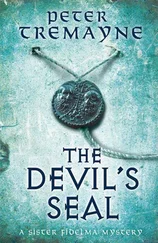Peter Tremayne - The Haunted Abbot
Здесь есть возможность читать онлайн «Peter Tremayne - The Haunted Abbot» весь текст электронной книги совершенно бесплатно (целиком полную версию без сокращений). В некоторых случаях можно слушать аудио, скачать через торрент в формате fb2 и присутствует краткое содержание. Жанр: Исторический детектив, на английском языке. Описание произведения, (предисловие) а так же отзывы посетителей доступны на портале библиотеки ЛибКат.
- Название:The Haunted Abbot
- Автор:
- Жанр:
- Год:неизвестен
- ISBN:нет данных
- Рейтинг книги:5 / 5. Голосов: 1
-
Избранное:Добавить в избранное
- Отзывы:
-
Ваша оценка:
- 100
- 1
- 2
- 3
- 4
- 5
The Haunted Abbot: краткое содержание, описание и аннотация
Предлагаем к чтению аннотацию, описание, краткое содержание или предисловие (зависит от того, что написал сам автор книги «The Haunted Abbot»). Если вы не нашли необходимую информацию о книге — напишите в комментариях, мы постараемся отыскать её.
The Haunted Abbot — читать онлайн бесплатно полную книгу (весь текст) целиком
Ниже представлен текст книги, разбитый по страницам. Система сохранения места последней прочитанной страницы, позволяет с удобством читать онлайн бесплатно книгу «The Haunted Abbot», без необходимости каждый раз заново искать на чём Вы остановились. Поставьте закладку, и сможете в любой момент перейти на страницу, на которой закончили чтение.
Интервал:
Закладка:
Garb pushed out his lower lip and half nodded.
‘My father is a stubborn man who cannot conceive of such a thing.’
‘I would speak with him.’
‘You may, but he is resting now. First, I would want to know what brought you into this affair. You say it was something to do with Brother Botulf?’
‘That is so,’ agreed Fidelma. ‘But the story is Eadulf’s and I am sure that he will have no objection to the telling of it.’
Eadulf agreed. ‘I have none, providing that we can exchange some information. Do we agree that there is some evil mystery at the abbey of Aldred?’
‘There is one evil there,’ said Garb curtly. ‘That is the Abbot Cild.’
‘The abbot seems to be a man of extreme opinions and actions,’ Fidelma intervened, ‘but whether this constitutes evil is a point which we may later consider.’
Brother Laisre snorted. ‘I think there is no question about his evil. Cild has been responsible for hanging two of my brethren whom he took captive. He had them executed as heretics to the faith — or rather to his particular interpretation of the faith.’
Fidelma’s eyes widened a little.
‘We agree,’ broke in Eadulf, ‘that Cild is a harsh man. You have only to ask the brother of his own blood what his opinion is. But we need information, as I have said before. I came to the monastery because I received a message from the friend of my youth, Brother Botulf, but when I arrived I found that he had been murdered. In the chapel, the other night, you seemed to imply that Abbot Cild had murdered Botulf. Why?’
Garb glanced at Brother Laisre and then he sighed.
‘You say that you are Brother Botulf’s friend? I would hear what you have to impart and then I will tell you what we know.’
Eadulf exchanged a look with Fidelma, who gestured her approval.
‘We must begin somewhere,’ she said. ‘Information for information.’
Briefly, though not sparing the important details, Eadulf recounted why they had made the journey to Aldred’s Abbey and what had befallen them there, including his dealings with the outlaw brother of the abbot.
When Eadulf ended his narration, Brother Laisre suggested that they continue over bowls of hot stew. When they were seated round the table, it was Garb who now commenced his story.
‘Three summers have passed since my family came to know Cild. He was one of a number of Saxon brothers who came to study at the religious house of Maigh Eo, the Plain of the Yew, where my father Gadra is chieftain. He was not like the other religious that I have known. He was more like a warrior, angry, aggressive and demanding.’
Garb paused as if gathering his thoughts into some order.
‘We were not too interested in him until he began to impress my younger sister, Gélgeis. She became besotted by him.’
Fidelma leaned forward. ‘You do not say that she fell in love with him. How old was Gélgeis?’
Garb glanced at her. ‘Oh, she was over the age of choice, if that is what you are asking. She was also determined. She was as stubborn as my father is stubborn. My father and I tried to dissuade her from marrying Cild. Even my sister, Mella, tried to discourage her. But Gélgeis was totally intoxicated by Cild. No, I do not say that she loved the man. I believe she was mesmerised by him. Before we could do anything further, she and Cild had left to come to this country.’
‘Do I then presume that you also believed that Cild was not in love with your sister?’
‘Cild is capable of many emotions,’ replied Garb. ‘I do not think love can be numbered among them. He wanted my sister for the material benefits which he thought he would gain. He did not fully appreciate our laws. He thought that once he was married, my father would set him up with wealth and position.’
‘But Cild came here and achieved a position as abbot.’
‘A poor abbot at that. However, my father saw the finalityof my sister’s situation and so sent word to Gélgeis that he had forgiven her for breaking his heart by running off with the Saxon. But there would be no dowry and Cild would not be welcome in Maigh Eo. Thereafter only two messages came from Gélgeis over the next year.’
Eadulf was interested. ‘Messages? By whom were they sent?’
‘By a religieux named Brother Pol. As Brother Laisre mentioned earlier, the community of Maigh Eo is called “Maigh Eo of the Saxons”. There is much contact between Maigh Eo and some of the Saxon religious. Gélgeis knew how to cut the Ogham and send her message on hazel wands so that few outside our circle would know what she had to say.’
‘And what did she have to say?’ Fidelma pressed.
‘The first message told us that Cild had been elevated to become abbot of Aldred’s Abbey and that she and he were living there. She said that she was happy but very homesick.’
He paused for a moment.
‘It was the way she worded the message that made us think that she was not being entirely honest and that she was unhappy with her life. The second message confirmed our anxieties. She was unhappy but she did not explain why. But Brother Pol told us that he thought Cild was treating her badly for he had noticed the searing wound of a whip on her arm. We asked Brother Pol to contact Gélgeis and bring further messages on his next trip.’
Fidelma’s eyes widened a little. ‘You did not think the news of her unhappiness was enough to bring one of your family to escort Gélgeis back home?’
Garb looked uncomfortable. ‘My father felt that brother Pol’s intermediacy was sufficient. But we did not hear from him again and after many months we decided to ask Brother Laisre here to make contact with her …’
‘Just a minute,’ Fidelma interrupted. ‘How did you know Brother Laisre?’
It was the Irish religieux who answered.
‘Brother Pol, the intermediary who took Gélgeis’s messages to Maigh Eo, had told Gadra about our little group here in Tunstall. So Gadra communicated with me to see if I could make contact with Gélgeis and ascertain what was happening. At the same timehe was anxious to learn the reason why he had not heard from Brother Pol.’
‘And did you contact Gélgeis?’
‘I tried, and that was when I discovered that Gélgeis was dead.’
‘One thing I would like to ask,’ intervened Eadulf. ‘You must know all the Irish in this area. Who is the young woman of Éireann with the red-gold hair who dwells close by the abbey?’
Brother Laisre looked blank. ‘A young woman with red-gold hair? I know of no such woman of our people in the land of the South Folk.’
Eadulf was surprised. He had told Fidelma on the journey what he had seen at the woodsman’s hut.
‘Perhaps she is a newcomer?’ suggested Fidelma.
Brother Laisre shook his head. ‘I would know of such a newcomer from our land and, if the truth be told, Sister, she would not long escape attention.’
Fidelma sighed. ‘Very well. I think, however, that you need to provide us with more details about your contact with Gélgeis. How did you set about getting in touch with her?’
‘She was dead by the time I tried to do so,’ explained Brother Laisre. ‘I went to the abbey disguised as a merchant and, by chance, it was Brother Botulf who spoke with me. I knew him before this nonsense decided at Whitby which has caused the split between us. He was a sympathetic man. It was from him that I learned that Gélgeis had, as her father and brother believed, grown unhappy. Cild was a vain and cruel man. He was unfit to be an abbot. Botulf said the girl had wandered into the marsh.’
‘Did Brother Botulf give any details of her death?’ Fidelma pressed.
‘No. He gave no details. Just that she had wandered into the marsh and that Cild was responsible. Those were his very words. Cild was responsible. There can be no interpretation to be placed on it other than murder. He told me that the body was lost in Hob’s Mire, an evil swamp of a place not far from the abbey. He said there was no use searching the quagmire for her body. He asked me to send word to her family that they should assume their daughter was dead to them.’
Читать дальшеИнтервал:
Закладка:
Похожие книги на «The Haunted Abbot»
Представляем Вашему вниманию похожие книги на «The Haunted Abbot» списком для выбора. Мы отобрали схожую по названию и смыслу литературу в надежде предоставить читателям больше вариантов отыскать новые, интересные, ещё непрочитанные произведения.
Обсуждение, отзывы о книге «The Haunted Abbot» и просто собственные мнения читателей. Оставьте ваши комментарии, напишите, что Вы думаете о произведении, его смысле или главных героях. Укажите что конкретно понравилось, а что нет, и почему Вы так считаете.











